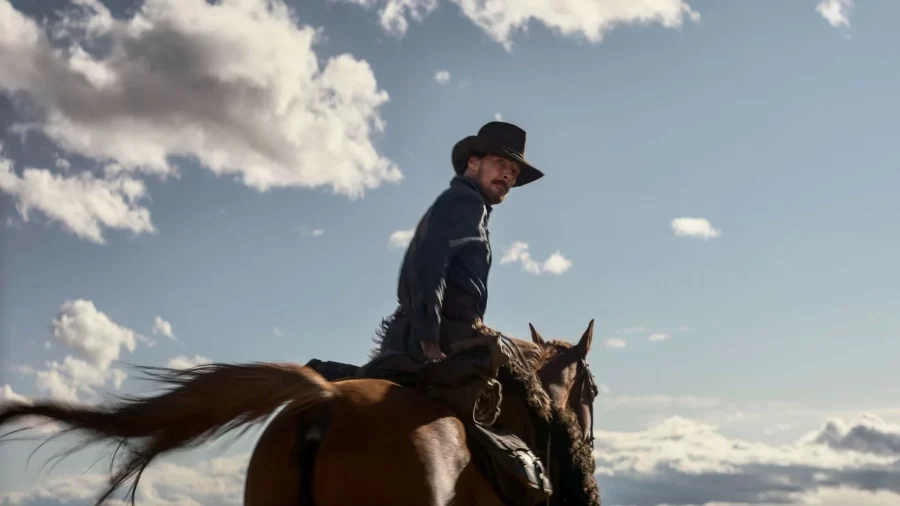“The Power of the Dog” a complex character study first, Western second
Benedict Cumberbatch sheds his Dr. Strange cape for a Stetson hat in The Power of the Dog. Photo courtesty Netflix.
December 26, 2021
Westerns have come a long way from the John Wayne serials and Spaghetti Westerns that defined the genre. Instead of gunslinging heroes and villains riding horses, cinema has evolved to use the backdrop of the wild west to tell more complex stories, with new releases in the genre often bringing about changes within the industry.
No Country for Old Men redefined the west as an unforgiving environment in contrast to the great outdoors that people fell in love with. Logan brought the genre back into the public consciousness by telling a somber yet rousing superhero story. And with The Power of the Dog, Jane Campion unveils the problematic masculinity that this genre was built on, delivering a technical and thematic feast for the ages.
The Power of the Dog is adapted from the 1967 novel of the same name, and stars Benedict Cumberbatch (Doctor Strange) as the awe- and fear-inducing rancher Phil Burbank, a rich man who is more comfortable in the dirt and on a horse than in his mansion. When his brother brings home a new wife and her son, he torments them until the possibility of love enters his heart. I have heard about this film for months since its premiere at the Venice International Film Festival and based on the critical reception, this film looks to be a big awards season contender. This and the stacked cast have made my hype for the movie extremely high. And I could not be happier that my expectations were met.
The Power of the Dog is extraordinarily personal, quiet, and methodical. Though the camera often showcases long and gorgeous scenery of the West, the focus is never on the sweeping nature. The beating heart of this film lies in the writing and direction, where Jane Campion’s skills shine considerably. She never rushes scenes to propel the plot, but instead elongates them to get the most out of every single character interaction.
By doing this, Campion gives the audience time to understand these characters completely. I know that people may call some of these scenes completely unnecessary since they don’t provide much to the main narrative. I would call them essential to not only discovering the layers of each character, but to getting a glimpse of the themes about how one’s masculinity and social status can affect our relationships with others. These types of scenes are abundant in The Power of the Dog, and I happily ate them up.
This movie would not be as engaging as it is without the extraordinary cast, in particular Benedict Cumberbatch. He is devastatingly ruthless and unforgiving as Phil Burbank, to the point where I almost despised him for some of the things he did. But the second half of the movie dares to humanize him, revealing the tender and damaged soul that lies underneath that tough facade. Through the subtlest facial expressions and vocal inflections, Cumberbatch is able to elicit sympathy and wonder just as easily as he can frustration and disgust. I was honestly shocked about how much I cared about him by the end, and most of it can be attributed to Cumberbatch’s masterful performance; it’s one of the best of the year. The rest of the cast is great as well; newcomer Kodi-Smit McPhee is purposefully awkward and distant as Kirsten Dunst’s son, and the latter embodied hidden stress and fear to a tee. And, of course, Jesse Plemons continues to astound with every acting role he takes (I can’t wait for him to win an Oscar some day).
Particular praise has to be directed towards Jonny Greenwood’s musical score. 2021 is looking to be the year of great Jonny Greenwood scores, with Spencer having an even more mesmerizing score than The Power of the Dog, but this movie utilizes the score masterfully all the same. There are many instances where scenes feature zero dialogue, and the only things keeping the movie afloat are the performances and the score. Greenwood’s use of strings and piano makes these moments even more emotional than they would have been with or without the dialogue, and the music as a whole captures the turmoil and pain within the characters to a haunting effect.
To think that The Power of the Dog would wind up completely capturing my heart may not have been a thought as wild as Spider-Man: No Way Home being good (that’s right I said it), but I never thought I would have cared about it this much. Not a day has gone by where I haven’t thought about this film and how well made it is. I love The Power of the Dog a lot, and it is, without question, one of the best movies of the year; I’m already rooting for this to win some Oscars. For deconstructing and reconstructing the wild West as a place of vulnerability, Jane Campion already cemented her movie in the history books of cinema.


Kana Wang • Apr 28, 2022 at 1:08 PM
Good job Devin!